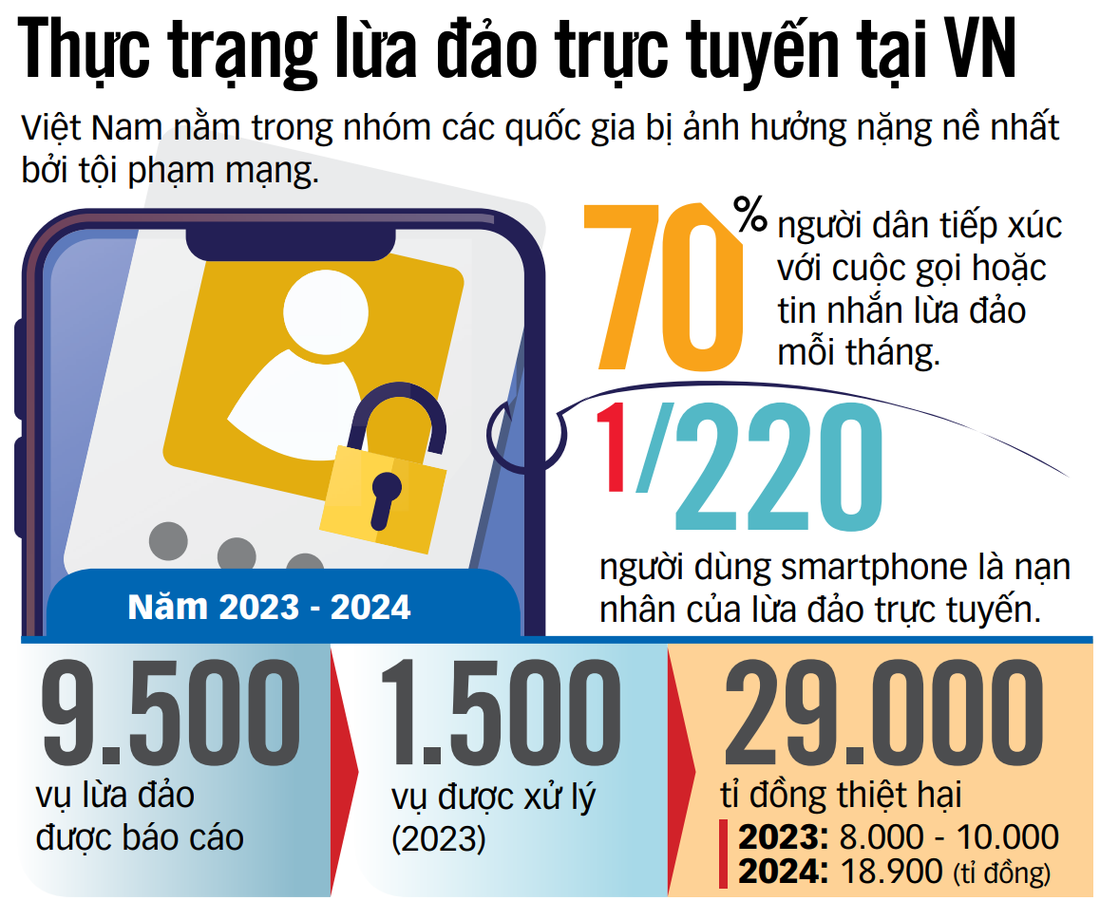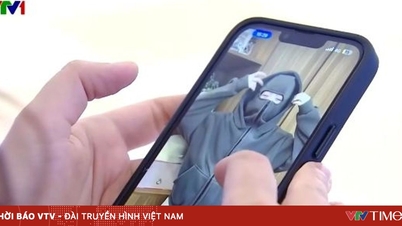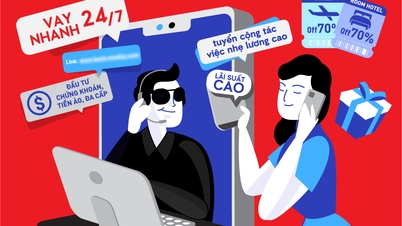
Illustrative AI image - Made by: N.KH.
The campaign aims to join hands in preventing and protecting children and teenagers from tricks of seduction, fraud, and "kidnapping" on cyberspace...
Talking to Tuoi Tre about the current situation of high-tech crimes, Lieutenant Colonel HO THO HAI - Deputy Head of the Department of Cyber Security and High-Tech Crime Prevention (Ho Chi Minh City Police) - commented: "Crimes using high technology to defraud and appropriate property are not only a burning issue in Vietnam but also a global challenge - a form of non-traditional crime that is increasingly sophisticated, infiltrating and causing negative impacts in many countries around the world ."

Source: National Cyber Security Association (NCA) Report - Graphics: N.KH.
Cybercriminals constantly "upgrade" their tricks
* As you just mentioned, high-tech crime is a global threat. So in our country, specifically in Ho Chi Minh City, what is the current situation of this type of crime?
- According to statistics from the Ho Chi Minh City Police Department's cyber security force, there are approximately 1,000 cases of cyber fraud recorded each year, and this is a type of crime with a high rate in the city.
Through our professional work, we have found that there are some common types of fraud. The first is impersonating state agencies, organizations, and businesses, taking advantage of the authority and prestige of these agencies, organizations, and businesses to commit fraud.
The second "scenario" is to take advantage of many people's psychology of wanting to make quick money to organize calls for investment in gold and virtual currency; more sophisticatedly, through different scam stories, scammers influence and manipulate the psychology of the "prey" to make them believe that this story is real, thereby instructing the "prey" to perform operations on electronic devices, bank accounts, and e-wallets to appropriate.
And finally, recently there has been a rise in scams targeting teenagers and students, which we often call "online kidnapping".


* The "online kidnapping" cases that have been on the rise since the beginning of this year show that cybercriminals seem to be changing their "tactics", shifting their targets from the elderly to young people?
- After a long time, the police force and departments, branches and organizations have increased propaganda so people's awareness of strange calls and messages has been raised.
Therefore, the subjects have "upgraded" their fraud tricks to cope with the precautions such as using higher quality deepfake videos , perfect, logical, and more deeply personalized scam messages/emails thanks to the application of new generation artificial intelligence technology.
The subjects also take advantage of events and opportunities to create new scam stories that have not been previously warned about.
For example, the situation of taking advantage of biometric authentication regulations for bank accounts to impersonate banks, calling for support to update biometric data online.
In addition, instead of advertising, persuading, and luring "prey" to join their financial investment channel, the scammer turns to getting acquainted, creating a "harmless" relationship for a long enough time, with enough trust, gradually making the "prey" think that there is an attractive investment channel, and from there, asking to join the channel.
Talking about "online kidnapping", this is a clear change in the methods of scammers, from older people who are not familiar with technology to more easily influenced and trusting "targets" such as young people and students.
Fraudsters often create sophisticated scenarios to approach, threaten, oppress and manipulate children psychologically, causing them to isolate themselves and follow all their requests.
The main reason is that many children are exposed to technology early but lack life experience and skills to identify risks online.

A victim of "online kidnapping" is self-isolating in Dak Lak but was successfully rescued by Ho Chi Minh City Police - Photo: Provided by the Police
Follow the recommendations, don't worry about falling into scam traps
* Regarding the police force in general, and Ho Chi Minh City Police in particular, what solutions have they been implementing to respond to and effectively combat this increasingly sophisticated type of crime?
- Being a unit directly fighting and preventing high-tech crimes requires us to constantly learn, constantly improve our political qualities and working capacity, regularly train our skills, modernize equipment and technical means, and one of the key tasks in the coming time is to build the Ho Chi Minh City Cyber Security Monitoring Center.
At the national level, we will soon sign the United Nations Convention against Cybercrime in Hanoi (Hanoi Convention), an event that will create a new legal corridor and a new legal framework for countries around the world to join hands to fight cybercrime.
* It is known that up to now, the authorities have counted nearly 300 different forms of fraud, and this number certainly does not stop there. In reality, every time a new "scenario" of fraud appears, we have to pay a high price to identify them?
- In fact, online fraud crimes can have many different scenarios, but the methods and tricks are the same, from approaching "prey", creating trust, carrying out psychological manipulation scenarios and then appropriating property.
To prevent, people need to follow recommendations from the police.
For example, it is recommended to limit contact with strangers on the internet, not to click on strange links, not to download strange software outside the CH Play and App Store app stores, and not to transfer money to strangers.
Prevention is still the most important and meaningful because it prevents crimes from happening and damages from arising.
* As you just said, prevention is the most important and is the campaign "Not alone - Together online safety" the solution to raise public awareness about high-tech crimes of fraud and "online kidnapping"?
- As shared, recently there has been a "online kidnapping" scheme with many unfortunate incidents occurring, targeting children and teenagers - this is a vulnerable and vulnerable group, requiring authorities to promptly have solutions to respond and prevent.
The campaign aims to raise awareness among children about the risks of luring, manipulating, scamming, "kidnapping", and human trafficking in cyberspace; equip them with online safety skills, how to identify tricks, how to prevent, handle and report dangerous situations.
The campaign also aims to spread the message of "Stay Safe Online Together" to remind children that they are not alone when facing online scams and to remind families, schools and society to always work together to protect the country's future generations.
Rescue many victims of "online kidnapping"
According to data from the Criminal Police Department (Ho Chi Minh City Police), from April until now, Ho Chi Minh City has recorded about 70 cases of "online kidnapping" and all victims have been successfully rescued.
A typical case is V. (18 years old, living in Cho Lon ward) - a victim of "online kidnapping" - was rescued by Ho Chi Minh City Police on August 5 while self-isolating in a hotel in Tan Lap ward, Dak Lak province. From a strange call informing him that he had an order containing drugs, V. was psychologically manipulated by the scammer to sell his mother's gold, pawn his red book, borrow money through an app... with the purpose of proving his "innocence".
Not stopping at the launching ceremony
The launching ceremony took place at the main bridge point, Le Hong Phong High School for the Gifted, and was connected online to nearly 1,000 bridges at junior high schools and high schools; vocational education centers; continuing education centers; and junior colleges and colleges in Ho Chi Minh City.
Lieutenant Colonel Ho Tho Hai affirmed that the Ho Chi Minh City Police did not independently deploy the campaign but coordinated with the Department of Education and Training in deploying the campaign in all schools in the area. At the same time, the Ho Chi Minh City Police directed the local police to continue advising the Party Committee and local authorities, and coordinate with local schools to organize appropriate propaganda activities for children.
Proposal to regulate biometric authentication for business accounts
* Most of the subjects using high technology to commit fraud often commit the act from abroad, however, the money is appropriated through domestic bank accounts. So what is the solution to prevent this trick, sir?
- Criminals have many methods and tricks such as renting, buying or asking others to open many bank accounts. After luring the victim to transfer money to the designated account, they divide the money into small amounts, transfer it around to many different accounts and then disperse it in many ways such as buying virtual money, electronic money, hiring others to withdraw it... to deal with being tracked by the authorities.
Currently, there are cases of subjects using corporate accounts, not only to gain trust from their "prey" but also to deal with regulations tightening conditions and limits on money transfers for personal accounts (transfers of over 10 million VND/time or over 20 million VND/day must be biometrically authenticated - PV).
However, when verified, these accounts are all "ghost" company information, virtual accounts. Currently, the police force is proposing that the State Bank regulate biometric authentication for business accounts.
* Ms. Huynh Le Nhu Trang (Deputy Director of the Department of Education and Training of Ho Chi Minh City):

Ms. Huynh Le Nhu Trang (Deputy Director of the Department of Education and Training of Ho Chi Minh City)
Join hands to protect children
Students using phones and accessing the Internet brings many benefits, helping them learn and expand their knowledge of the world around them. However, this also poses many risks if they participate in the online environment without guidance and supervision from parents and schools.
Nowadays, online scammers are constantly coming up with sophisticated and unpredictable scenarios. It is important to change children's perceptions through many channels and forms of propaganda.
For example, if there is a phone call impersonating the police, it is necessary to instruct students on how to behave, how to report to their families and schools to coordinate prevention. We cannot let students handle situations on their own, we must have concern and sharing from families, schools and society.
The education sector has implemented many synchronous solutions such as integrating educational information and digital skills into regular classes, experiential sessions, flag-salute activities, and group activities with homeroom teachers to educate students on skills to identify, prevent, and respond to fraudulent situations online.
In addition, in coordination with specialized units, businesses or Ho Chi Minh City Police, many training courses on cyberspace safety will be organized, raising students' awareness of participating in the "virtual" world, and building a healthy and safe learning environment. (Dan Thuan - Ky Phong)
* Master Than Thi Tuyet Nhung (Principal of Chu Van An Secondary School, Cau Ong Lanh Ward):

Master Than Thi Tuyet Nhung (Principal of Chu Van An Secondary School, Cau Ong Lanh Ward)
Parental involvement is essential.
Previously, our school had an 8th grader who was "kidnapped online". The incident started when the student was beaten by his father, he was sad and confided in the internet. So the "kidnapper" lured him and gave him money, instructing him to take a bus to the North.
Luckily, the school and family discovered it early, and with the cooperation of the bus company, when I arrived in Hue, I was kept.
Therefore, launching an online safety campaign at this time is very necessary and useful. At my school, we will connect the signal so that students can follow the topic right in class. The school has also sent notices to parents. Parents will attend with their children in the classroom or with teachers in the teacher's room.
I think it is very important to have parents participate, so that they can fully understand the problem and closely coordinate with the school in preventing "online kidnapping" in particular and educating students to stay safe when participating in online activities in general.
This issue also requires a series of regular and continuous activities to educate students on appropriate online behavior.
Source: https://tuoitre.vn/cap-bach-bao-ve-an-toan-tre-em-tren-khong-gian-mang-20251019220150157.htm




![[Photo] National Assembly Chairman Tran Thanh Man attends the VinFuture 2025 Award Ceremony](/_next/image?url=https%3A%2F%2Fvphoto.vietnam.vn%2Fthumb%2F1200x675%2Fvietnam%2Fresource%2FIMAGE%2F2025%2F12%2F05%2F1764951162416_2628509768338816493-6995-jpg.webp&w=3840&q=75)

![[Photo] 60th Anniversary of the Founding of the Vietnam Association of Photographic Artists](/_next/image?url=https%3A%2F%2Fvphoto.vietnam.vn%2Fthumb%2F1200x675%2Fvietnam%2Fresource%2FIMAGE%2F2025%2F12%2F05%2F1764935864512_a1-bnd-0841-9740-jpg.webp&w=3840&q=75)






































































































Comment (0)